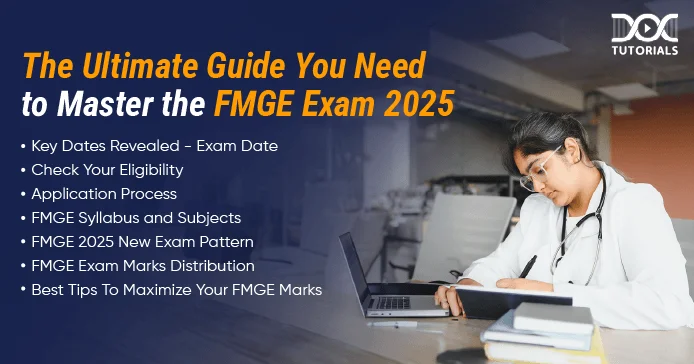
One of the most challenging aspects of being a medical student is having to deal with a tremendous amount of study material to remember, theoretically and practically. The syllabus of any medical exam is vast, and medical science is proliferating too. Keeping everything learnt in memory feels next to impossible.
Even so, we get well-educated doctors, year after year, totally competent in all they have studied. How do they retain all the knowledge they have acquired? How do they recall everything they need to know when diagnosing a patient for an illness? How do they have space in their minds for more information about new medical inventions and discoveries?
It all comes down to having some specific learning methods for medical study. Psychologists have done quite a bit of research on practices that students in the medical field can use to absorb information better.
Some medical curricula, like those taught by DocTutorials (one of Indias premier online medical entrance exam coaching institutes), are cleverly structured to guide students in distinctly productive ways.
Let’s examine first what psychologists say about knowledge acquisition approaches for students of medical courses – and then examine the curricula at DocTutorials to see how well it is planned.
3 problems medical learners face when mastering large amounts of information
According to Rishi Desai and Shiv Gaglani, in their paper “How To Study In Medical School”, published by MSD Manual, they say, “The volume of information that you need to take in and memorise in medical school is much greater than in college. Some students compare the flow of information coming at them to drinking out of a fire hose.”
They refer to the three biggest hurdles students face in medical courses and suggest how to overcome these:
Rapid forgetting is the first hurdle. The volume of what medical qualification aspirants must know is enormous. It’s easy for students minds to forget as a self-preservation response. The best strategies to combat this are spaced repetition (re-studying material repeatedly at regular periodic intervals) and interleaved practice (testing on memorised materials in a mixed-up fashion).
Passive studying is the second hurdle. It’s what tired minds do when they must imbibe something new or extra to what they have already gleaned. Students may be tempted to read from their textbooks without engaging the mind to absorb the material. By far, testing frequently is believed to be the best way to shake students minds out of disengagement.
Reversion to past behaviours is the third hurdle. It occurs when students in medical disciplines use the same information retention techniques that helped them in earlier education. Psychologists believe there has to be a new mindset born in those studying for medical degrees. If they sense the importance of their future professions as socially-valuable doctors, it will trigger their motivation to assimilate information beyond ordinary levels.
5 simple memory-building techniques medical students will find invaluable
In an article by Windsor.edu titled “5 Science-Backed Learning Strategies for Medical Students”, they have tips for improving study schedules and patterns.
• Splitting study material into manageable chunks or lots
Students may vary in how much they can absorb in a given study session. So, when breaking up large amounts of study material into smaller manageable chunks, they have to see their individual memory thresholds. This type of study is the opposite of large volumes of overnight cramming before tests.
• Taking adequate breaks between any two study sessions
Breaks refresh minds – and if two different study sessions on two different subjects are scheduled, breaks will help ease minds out of the first subject and slide into the next one. Staying active during breaks – like taking walks, stretching muscles or doing other chores – can refresh minds faster.
• Increasing blood to the brain via safe aerobic workouts
Aerobic exercises can have both long- and short-term effects on mind-building ability. They can improve cognition and memory by boosting blood flow to the brain. With their brains getting a good supply of oxygen and vital nutrients, students can energize their sympathetic nervous systems, which are responsible for increased memory.
• Learning to overcome the Ebbinghaus Forgetting Curve
The Ebbinghaus Forgetting Curve is a well-known memory model in psychology. Its premise is that information will slip out of memory over time – unless action is taken to keep it there. Researchers say humans will forget approximately 50% of any new information within one hour. So, revising lectures daily is not just a nice thing to do; it’s imperative.
• Studying before night sleep works wonders for memory
It’s age-old wisdom that the last thoughts gathered before a night’s sleep get deeply embedded into the brain. Scientific research now validates this ancient idea. Also, the quality of sleep at night can help in the process. Deep undisturbed sleep can enhance memory even better.
The upgraded DocTutorials coaching app Version 2.023 enhances ease of study
Following the best practices in medical teaching, DocTutorials has developed its Multi-Disciplinary Approach (MDA) to train its students for tough medical entrance exams like NEET PG, NEET SS, FMGE, INICET and INISS.
The principle that DocTutorials adopts is that education for medical proficiency should be structured for ease of memorising and retention and should have diverse components to it for a 360-degree subject understanding.
With this dictum underlying its coaching methods, DocTutorials new upgraded coaching app Version 2.023 is geared towards enhancing students information absorption capabilities, making them ready for Year 2023.
This new app is replete with enriched, immersive content structured in a user-friendly, experience-centric menu:
- Video Lectures – with hours of content on the full range of 19 subjects: Enhanced with technologically-superior 2D/3D animations, these videos encourage experiential comprehension of critical topics. They bring theoretical knowledge into the realm of practical reality.
- 70+ Integrated MCQ Discussion Videos (IMDVs) – featuring expert faculty: These IMDVs can be enlightening for students as they help solve New Pattern MCQs. By watching debates between renowned faculty members, they can get a grip on complex topics with varied nuances.
- Several tests per subject – in a refreshed Test Series: The Test Series includes a steady schedule of subject tests, revision tests, grand tests and elite tests. These help students assess their subject grasp regularly and replace any exam anxiety with bolstered confidence.
- Over 17000+ well-chosen questions – in QBank 2nd Edition: DocTutorials is a storehouse of past question papers and New Pattern additions as well. It has Image Based Questions (IBQs) and 17000+ Multiple Choice Questions (MCQs).
- System Based Integrated Test Series (SBITs) – for in-depth learning: These tests aim to teach students about the human body through its various systems that operate in sync. This method of instruction leads to more a granular understanding.
- Rigorous Test & Discussion (T&D) sessions – to sharpen focus and skills: These regular tests and discussions with faculty expose students to potential exam questions (supported by images and videos). Such sessions help with assiduous preparation.
- Interactive Live Sessions – to leverage a wealth of knowledge: These are invaluable opportunities for students to interact with faculty members, clear doubts and queries, go over past exam questions and learn how to prepare for the Quick Revision Programmes (QRPs).
- Leaderboard tests – for a competitive edge and a reality check: The Leaderboard is a ranking table that shows up-to-date results of quizzes and tests so that students can know how they are faring vis-a-vis their peers – and what areas of study they need to strengthen.
Those downloading, signing up and subscribing to the new DocTutorials coaching app V 2.023 for NEET PG students will be able to lift their medical learning strategies to the next level. The future is already here.
Latest Blogs
-

FMGE Exam Preparation with Our FMGE 2025 Vijeta Online Live Plan
FMGE (Foreign Medical Graduate Examination) 2025 is going to be daunting for multiple factors. But with the right tools and…
-

FMGE Exam 2025: Date, Eligibility, Application, Syllabus & Subjects, and Exam Pattern
The Foreign Medical Graduate Examination (FMGE), slated for 2025, remains a pivotal assessment for foreign medical graduates aspiring to practice…
 Back
Back